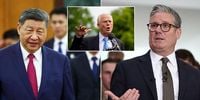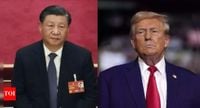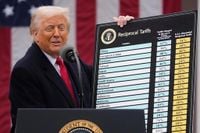As the trade tensions between the United States and China continue to escalate, a potential thaw in relations has emerged. On Friday, May 2, 2025, China's commerce ministry announced that it is evaluating approaches from U.S. officials to initiate negotiations regarding tariffs, a move that could signal a de-escalation of the ongoing trade war.
In a statement, the ministry emphasized, "If we fight, we will fight to the end; if we talk, the door is open." This declaration underscores China's position that the U.S. must demonstrate sincerity and readiness to rectify its "wrong practices" by canceling unilateral tariffs that were imposed without mutual agreement.
China's willingness to engage in dialogue comes amid reports that it has compiled a list of U.S. goods that could be exempt from its hefty 125% tariffs. This list is reportedly expanding to include items such as U.S. ethane, certain semiconductor products, and pharmaceuticals, aimed at easing trade tensions while maintaining a tough public stance.
Despite these developments, President Donald Trump has defended the 145% tariffs on Chinese imports, asserting that China "deserves it" and would likely absorb the costs. However, these comments are at odds with internal discussions within the administration regarding potential phased tariff reductions. In fact, Trump recently signed an order offering exemptions to specific car and parts tariffs for U.S. automakers, clarifying that companies already paying tariffs on imported vehicles would not face additional levies on steel.
While some tariff relief appears to be on the horizon for U.S. automakers, duties on auto parts are set to take effect on Saturday, May 3, 2025. The uncertainty surrounding tariffs has led to a cautious atmosphere within the manufacturing sector, with reports indicating that U.S. manufacturing activity shrank by the most in five months as of May 1, 2025. James Knightley, chief international economist at ING, noted, "The on-off-on-off nature of the tariffs is creating huge uncertainty and that is leading to businesses sitting on their hands. They won’t make big decisions until they have some confidence that there won’t be another immediate change in the economic environment."
In the corporate world, the impact of tariffs is becoming increasingly evident. Newell Brands announced a 10% price increase but clarified that it has not yet accounted for the 125% tariff rate on Chinese goods. CEO Chris Peterson stated, "We have probably three or four months of inventory on hand in the U.S. that is not subject to the tariff," indicating that the company is attempting to manage costs while navigating the tariff landscape.
Similarly, eBay's CEO Jamie Iannone highlighted the company's efforts to educate customers about tariff-related price hikes and delays, while Kraft Heinz CFO Andre Maciel mentioned that the company is striving to minimize price increases despite rising costs due to tariffs.
The tariffs are also impacting consumer behavior, with U.S. consumer spending rising in March as households rushed to buy goods ahead of anticipated price hikes. However, the long-term effects of tariffs are raising concerns about economic growth. Economists predict that the ongoing trade war could dampen economic expansion in the short term.
In a related development, Canadian Prime Minister Mark Carney is scheduled to meet with President Trump next week, marking their first face-to-face encounter since Carney's electoral victory. This meeting comes amid ongoing discussions about the trade relationship between the U.S. and Canada.
Amidst the turmoil, the U.S. Federal Reserve is expected to maintain its current pause on interest rate cuts as it assesses the impact of Trump's tariff policies on the economy. Recent job data showed that the U.S. economy added 177,000 jobs in April, easing recession fears and providing a glimmer of hope for economic stability.
As the global trade landscape shifts, the influence of China in the ASEAN region is growing, exacerbated by the U.S.'s heavy-handed approach to tariffs. Trump's tariffs have accelerated Southeast Asia's pivot toward China, complicating Washington's relationship with ASEAN nations that are increasingly wary of America's shifting policies.
Peter Navarro, Trump's trade adviser, has voiced concerns about Britain's relationship with China, labeling the UK as a "compliant servant of communist China" and urging the government to resist Chinese investments that could undermine its sovereignty. This sentiment reflects the broader apprehension within the Trump administration regarding China's growing influence in global markets.
In light of these developments, the upcoming months will be crucial for U.S.-China relations and the broader global economy. As negotiations loom, the stakes are high for both nations, and the outcome could significantly impact trade dynamics worldwide.






